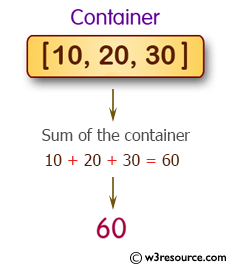Python: Calculate the sum over a container
Python Basic: Exercise-82 with Solution
Write a Python program to calculate the sum of all items of a container (tuple, list, set, dictionary).
Some objects contain references to other objects; these are called containers. Generally, containers provide a way to access the contained objects and to iterate over them. Examples of containers are lists, sets, tuples and dictionaries.
Pictorial Presentation:

Sample Solution:
Python Code:
s = sum([10,20,30])
print("\nSum of the container: ", s)
print()
Sample Output:
Sum of the container: 60
Visualize Python code execution:
The following tool visualize what the computer is doing step-by-step as it executes the said program:
list container:
Python Code:
nums = [10,20,30]
print("Original container:")
print(nums)
print(type(nums))
print("Sum of all items of the said container:", sum(nums))
Sample Output:
Original container: [10, 20, 30] <class 'list'> Sum of all items of the said container: 60
dictionary container:
Python Code:
def dict_sum(nums):
num_sum = 0
for i in nums:
num_sum = num_sum + nums[i]
return num_sum
nums = {'a': 100, 'b':200, 'c':300, 'd':120}
print("Original container:")
print(nums)
print(type(nums))
print("Sum of all items of the said container:", dict_sum(nums))
Sample Output:
Original container:
{'a': 100, 'b': 200, 'c': 300, 'd': 120}
<class 'dict'>
Sum of all items of the said container: 720
set container:
Python Code:
nums = {7, 4, 9, 1, 3, 2}
print("The original container")
print(nums)
print(type(nums))
sum_tuple = sum(nums)
print("Sum of all items of the said container:", str(sum_tuple))
Sample Output:
The original container
{1, 2, 3, 4, 7, 9}
<class 'set'>
Sum of all items of the said container: 26
tuple container:
Python Code:
nums = (7, 4, 9, 1, 3, 2)
print("The original container")
print(nums)
print(type(nums))
sum_tuple = sum(nums)
print("Sum of all items of the said container:", str(sum_tuple))
Sample Output:
The original container (7, 4, 9, 1, 3, 2) <class 'tuple'> Sum of all items of the said container: 26
Python Code Editor:
Have another way to solve this solution? Contribute your code (and comments) through Disqus.
Previous: Write a Python program to concatenate N strings.
Next: Write a Python program to test if a certain number is greater than all numbers of a list.
What is the difficulty level of this exercise?
Test your Programming skills with w3resource's quiz.
Python: Tips of the Day
Find current directory and file's directory:
To get the full path to the directory a Python file is contained in, write this in that file:
import os dir_path = os.path.dirname(os.path.realpath(__file__))
(Note that the incantation above won't work if you've already used os.chdir() to change your current working directory, since the value of the __file__ constant is relative to the current working directory and is not changed by an os.chdir() call.)
To get the current working directory use
import os cwd = os.getcwd()
Documentation references for the modules, constants and functions used above:
- The os and os.path modules.
- The __file__ constant
- os.path.realpath(path) (returns "the canonical path of the specified filename, eliminating any symbolic links encountered in the path")
- os.path.dirname(path) (returns "the directory name of pathname path")
- os.getcwd() (returns "a string representing the current working directory")
- os.chdir(path) ("change the current working directory to path")
Ref: https://bit.ly/3fy0R6m
- New Content published on w3resource:
- HTML-CSS Practical: Exercises, Practice, Solution
- Java Regular Expression: Exercises, Practice, Solution
- Scala Programming Exercises, Practice, Solution
- Python Itertools exercises
- Python Numpy exercises
- Python GeoPy Package exercises
- Python Pandas exercises
- Python nltk exercises
- Python BeautifulSoup exercises
- Form Template
- Composer - PHP Package Manager
- PHPUnit - PHP Testing
- Laravel - PHP Framework
- Angular - JavaScript Framework
- Vue - JavaScript Framework
- Jest - JavaScript Testing Framework
